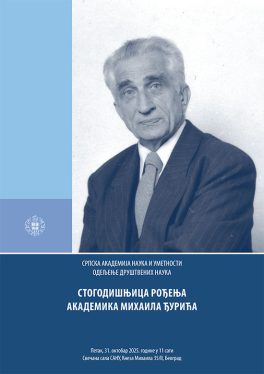Centennial of the Birth of Academician Mihailo Đurić
On Friday, 31 October, at the Grand Hall of the Serbian Academy of Sciences and Arts, a ceremony was held to mark the centennial of the birth of Academician Mihailo Đurić.
Mihailo Đurić (b. Šabac, 22 August 1925 – d. Belgrade, 25 November 2011) was a philosopher, jurist and sociologist, a full professor at the Faculty of Law, University of Belgrade, principal research fellow of the Institute of Social Sciences and a full member of the Serbian Academy of Sciences and Arts.
He graduated from the Faculty of Law at the University of Belgrade in 1949 and received his doctoral degree in 1954 with the dissertation ‘Concepts of Natural Law among the Greek Sophists’. That same year, he was appointed an assistant at the Faculty of Law, where he went on to hold all academic ranks, becoming a full professor in 1969. He taught several courses, including The History of Political and Legal Theories (the Department of State Law), General Sociology and Methodology of Social Sciences.
In 1971, during a discussion on constitutional amendments, he cautioned about the risks facing Yugoslavia and the Serbian people, for which he was dismissed from the university and sentenced to a nine-month prison sentence in 1973. After serving his sentence, he worked at the Institute of Social Sciences in the period 1974 to 1989. He was a visiting professor at the universities in Vienna, Western Berlin and Augsburg. He served as the president of the Science Council of the Institute of Philosophy at the Faculty of Philosophy in Belgrade (1986-1997). He returned to the Faculty of Law in 1989. He was rehabilitated by the court in 2009.
He was elected a corresponding member of the Serbian Academy of Sciences and Arts in 1994 and became a full member in 2000. From 2003 to 2010, he carried out the duties of the secretary of the Department for Social Sciences and was a member of the SASA Presidency when he retired from duties. He published collected essays in 12 volumes in 2009. His scholarly work encompassed a wide range of fields, including ancient philosophy (Humanism as a Political Ideal), sociology (Problems of Sociological Methods, Max Weber’s Philosophy), Nietzsche’s philosophy (The Challenges of Nihilism, Nietzsche and Metaphysics, Paths to Nietzsche), and Serbian philosophy (Philosophy in the Diaspora, Petronijević’s Principles of Metaphysics).

